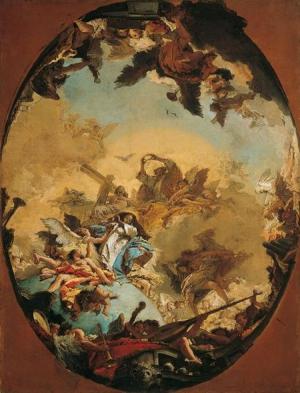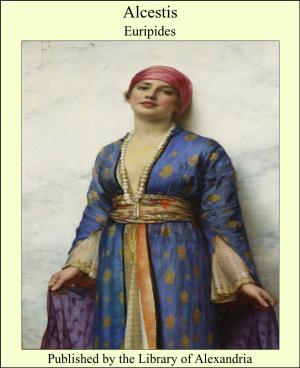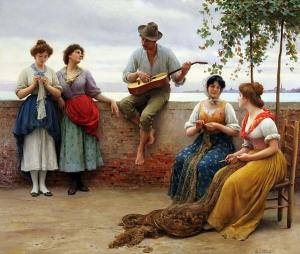Ecstasy, A Study of Happiness: A Novel
Nonfiction, Religion & Spirituality, New Age, History, Fiction & Literature| Author: | Louis Couperus | ISBN: | 9781465506122 |
| Publisher: | Library of Alexandria | Publication: | March 8, 2015 |
| Imprint: | Language: | English |
| Author: | Louis Couperus |
| ISBN: | 9781465506122 |
| Publisher: | Library of Alexandria |
| Publication: | March 8, 2015 |
| Imprint: | |
| Language: | English |
Then she knew, next day, when she sat alone, wrapped in reflection, that the sphere of happiness, the highest and brightest, may not be trod; that it may only beam upon us as a sun; and that we may not enter into it, into the sacred sun-centre. They had done that.... Listless she sat, with her children by her side, Christie looking pale and languid. Yes, she spoiled them; but how could she change herself? Weeks passed; and Cecile heard nothing from Quaerts. It was always so: after he had been with her, weeks would drag by without her ever seeing him. For he was much too happy with her, it was more thanhe could bear. He looked upon her society as a rare pleasure to be very jealously indulged. And she, she loved him simply, with the innermost essence of her soul, loved him frankly, as a woman loves a man.... She always wanted him, every day, every hour, at every pulse of her life. Then she met him by chance, at Scheveningen, where she had gone one evening with Amélie and Suzette. Then once again at a reception at Mrs. Hoze’s. He seemed shy with her; and a certain pride in her kept her from asking him to call. Yes, something was changed in what had been woven between them. But she suffered sorely, suffered also because of that foolish pride, because she had not humbly begged him to come to her. Was he not her god? Whatever he did was good. So she did not see him for weeks and weeks. Life went on: each day she had her little occupations, in her household, with her children; Mrs. Hoze reproached her for her withdrawal from society and she began to think more about her friends, to please Mrs. Hoze, who had asked this of her. There were flashes in her memory; in those flashes she saw the dinner-party, their conversations and walks, all her love for him, all his reverence for her whom he called Madonna; their last evening of light and ecstasy. Then she smiled; and the smile itself beamed over her anguish, her anguish in that she no longer saw him, in that she felt proud and cherished a little inward bitterness. Yet all things must be well, as he wished them to be. Oh, the evenings, the summer evenings, cooling after the warm days, the evenings when she sat alone, staring out from her room, where the onyx lamp burnt with a subdued flame, staring out of the openwindows at the trams which, with their tinkling bells, came and went to Scheveningen, full, full of people! Waiting, the endless long waiting, evening after evening in solitude, after the children had gone to bed! Waiting, when she simply sat still, staring fixedly before her, looking at the trams, the tedious, everlasting trams! Where was her modulated joy of dreaming happiness? And where, where was her radiant happiness? Where was her struggle within herself between what she was and what he saw in her? This struggle no longer existed, this struggle also had been overcome; she no longer felt the force of passion; she only longed to see him come as he had always come, as he no longer came. Why did he not come? Happiness palled; people were talking about them.... It was not right that they should see much of each other—he had said so the evening before that highest happiness—not good for him and not good for her.
Then she knew, next day, when she sat alone, wrapped in reflection, that the sphere of happiness, the highest and brightest, may not be trod; that it may only beam upon us as a sun; and that we may not enter into it, into the sacred sun-centre. They had done that.... Listless she sat, with her children by her side, Christie looking pale and languid. Yes, she spoiled them; but how could she change herself? Weeks passed; and Cecile heard nothing from Quaerts. It was always so: after he had been with her, weeks would drag by without her ever seeing him. For he was much too happy with her, it was more thanhe could bear. He looked upon her society as a rare pleasure to be very jealously indulged. And she, she loved him simply, with the innermost essence of her soul, loved him frankly, as a woman loves a man.... She always wanted him, every day, every hour, at every pulse of her life. Then she met him by chance, at Scheveningen, where she had gone one evening with Amélie and Suzette. Then once again at a reception at Mrs. Hoze’s. He seemed shy with her; and a certain pride in her kept her from asking him to call. Yes, something was changed in what had been woven between them. But she suffered sorely, suffered also because of that foolish pride, because she had not humbly begged him to come to her. Was he not her god? Whatever he did was good. So she did not see him for weeks and weeks. Life went on: each day she had her little occupations, in her household, with her children; Mrs. Hoze reproached her for her withdrawal from society and she began to think more about her friends, to please Mrs. Hoze, who had asked this of her. There were flashes in her memory; in those flashes she saw the dinner-party, their conversations and walks, all her love for him, all his reverence for her whom he called Madonna; their last evening of light and ecstasy. Then she smiled; and the smile itself beamed over her anguish, her anguish in that she no longer saw him, in that she felt proud and cherished a little inward bitterness. Yet all things must be well, as he wished them to be. Oh, the evenings, the summer evenings, cooling after the warm days, the evenings when she sat alone, staring out from her room, where the onyx lamp burnt with a subdued flame, staring out of the openwindows at the trams which, with their tinkling bells, came and went to Scheveningen, full, full of people! Waiting, the endless long waiting, evening after evening in solitude, after the children had gone to bed! Waiting, when she simply sat still, staring fixedly before her, looking at the trams, the tedious, everlasting trams! Where was her modulated joy of dreaming happiness? And where, where was her radiant happiness? Where was her struggle within herself between what she was and what he saw in her? This struggle no longer existed, this struggle also had been overcome; she no longer felt the force of passion; she only longed to see him come as he had always come, as he no longer came. Why did he not come? Happiness palled; people were talking about them.... It was not right that they should see much of each other—he had said so the evening before that highest happiness—not good for him and not good for her.















